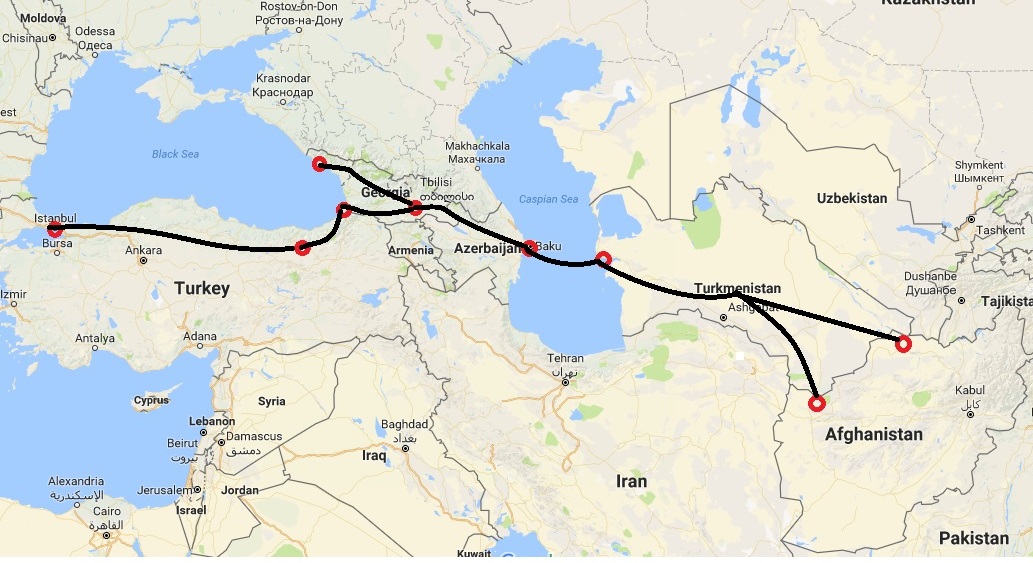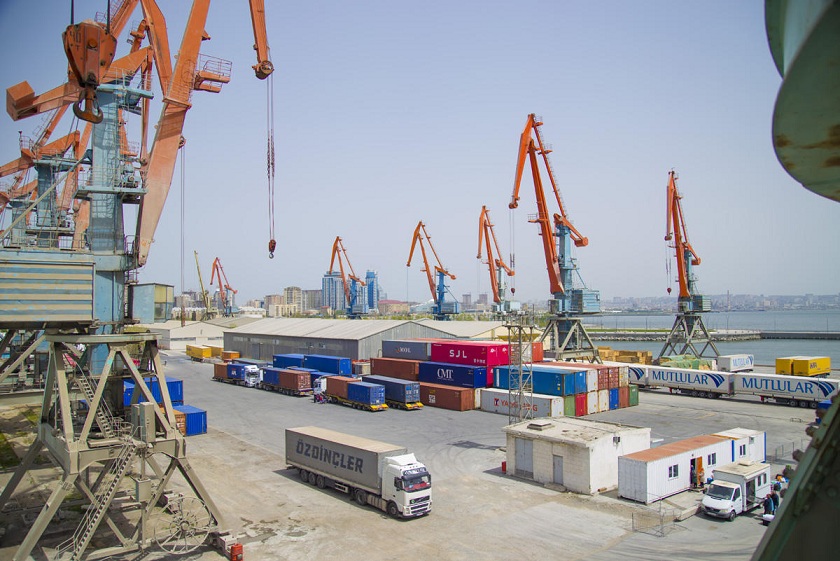Eurasian trade volumes are about to get a boost, thanks to multinational cooperation between the Caspian region’s Azerbaijan and Turkmenistan, which are teaming up with Georgia, Turkey and Afghanistan.
Officials from all five countries met on November 15 in Turkmenistan’s capital city of Ashgabat to finalize an agreement to construct a new transportation corridor called Lapis Lazuli, after the famed deep blue-colored stone mined in Afghanistan.
“The signing of the deal is a milestone in our collective efforts to achieve greater connectivity,” Afghanistan’s Foreign Minister Salahuddin Rabbani said at the seventh Regional Economic Cooperation Conference on Afghanistan in Ashgabat, where the deal was signed.
Lapis Lazuli is considered to be the shortest route for Afghanistan to ship its goods to the Black Sea, the Mediterranean, and the European market.
The $2 billion project is the outcome of three years of negotiations between the five stakeholder countries. It is meant to improve rail, road and sea infrastructure throughout the South Asian and Transcaucasus regions, coordinate custom operations along the route, allow for easy issuance of business visas to traders, establish Free Trade Zones in all five countries, and reduce overall transaction costs.
The Lapis Lazuli corridor will be synchronized with other trade routes that cut through the region, including the massive North–South Transport Corridor, which extends from India to Finland.
The actual route, however, includes railroads that pass through the Afghan cities of Aqina, in the north and Torghundi in the west, and link to Turkmenistan’s Turkmenbashi port city along the Caspian Sea. There, the route allows for sea transport to the coastal city of Baku, the capital of Azerbaijan. Railways in the Transcaucasus allow for good traveling along the route to make their way to Tbilisi, Georgia, as well as the Georgian Black Sea ports of Poti and Batumi, before reaching Kars and Istanbul in Turkey.
In Turkey, it will connect to the Middle Corridor Project, or the East-West Trans-Caspian Trade and Transport Corridor, which links Turkish markets to those in Europe.

Eighty percent of goods moving along the Lapis Lazuli and destined for Europe will move by railway and across the Caspian and Black seas by maritime means.
“Goods will be transited by railway [from Afghanistan]. It is a new way that will directly connect Afghanistan to Europe,” said Khan Jan Alokozay, Deputy Head of the Afghanistan Chamber of Commerce and Industries, when discussing the project last month, according to reporting by Tolonews.
The name Lapis Lazuli comes from an historic trade route that had been integral to the legendary and ancient transcontinental Silk Road. Lapis lazuli stone, which has been mined and coveted since the seventh millennium B.C., was transported along that route from Afghanistan to as far away as modern-day Mauritania in Africa.
The new corridor of the same name is considered to be the linchpin to reviving Afghanistan’s economy and its role in global trade.







 President Aliyev emphasized the critical role of the North-South Transport Corridor in fostering transport cooperation between Azerbaijan and Russi...
President Aliyev emphasized the critical role of the North-South Transport Corridor in fostering transport cooperation between Azerbaijan and Russi...
 Armenian sappers commenced on Monday mine-clearance operations in the territories adjacent to the Saint Mary Church in village of Voskepar (Armenia...
Armenian sappers commenced on Monday mine-clearance operations in the territories adjacent to the Saint Mary Church in village of Voskepar (Armenia...
 Russian Foreign Minister Sergei Lavrov has reasserted that Moscow has no intentions to stop the fighting in Ukraine, even if peace talks commence.
Russian Foreign Minister Sergei Lavrov has reasserted that Moscow has no intentions to stop the fighting in Ukraine, even if peace talks commence.
 Iran has refuted reports of alleged damage to Shimon Peres Negev Nuclear Research Centre located southeast of Dimona, Israel, during the recent air...
Iran has refuted reports of alleged damage to Shimon Peres Negev Nuclear Research Centre located southeast of Dimona, Israel, during the recent air...



